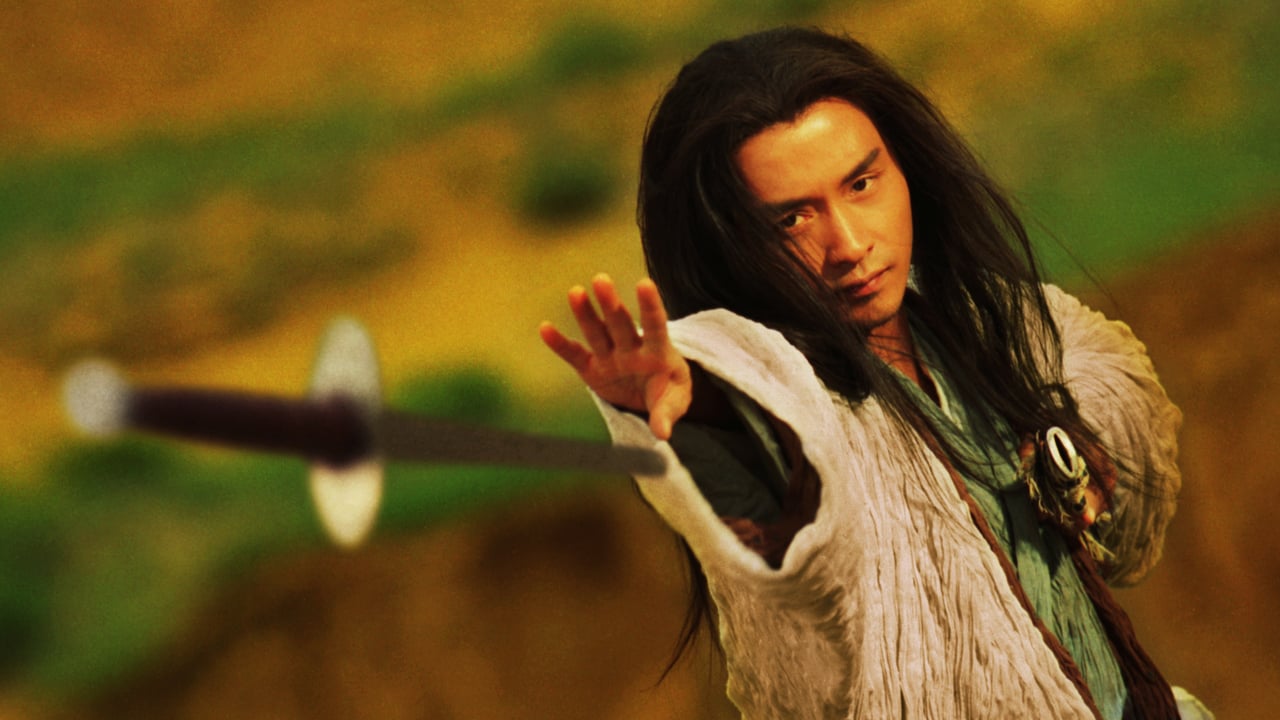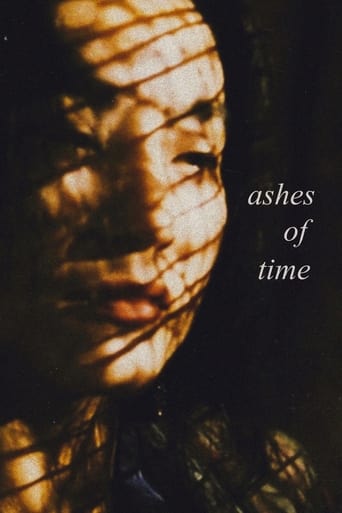

ASHES OF TIME REDUX is one of those films that I just don't see eye to eye with. I'm no fan of arty farty, insubstantial, abstract movies full of posturing, hidden layers and complex character machinations, and this is one of those films. It's supposed to be an ultra-stylish martial arts historical film, but I just found it an ultra bore.We're saddled with Leslie Cheung's boring philosophiser for much of the running time, while more interesting characters – like Tony Leung's myopic swordsman – come and go in the blink of an eye. Although billed as an action film, there are only around two fight sequences in this one, each filmed in a wooshy-wooshy fluid slow-motion style so that it's difficult to see what's going on. You get the idea that the director looks down on 'action' films and is going out to his way to make an obtuse, audience-unfriendly motion picture. It's an art film where I just don't see the art; as a result, I found this a worthless waste of time.
... View MoreASHES OF TIME, whether in its original 1994 version or the restored 2008 one known as "Redux", is not a conventional martial arts (wuxia pian) film. Neither is it an adaptation of Louis Cha's popular novel "Dōng xié xi dú". Nor is there an actual narrative as such. Rather, it's a collection of meditations on characters from Cha's novel, captured through some of the most astonishingly original and breathtaking images in film history. Please be aware of this before you approach ASHES OF TIME (REDUX) - otherwise you might be disappointed.The "plot", if you can call it that, concerns Ouyang Feng (Leslie Cheung), who runs a dingy little pension in some unidentified Chinese desert. He recruits hapless swordsmen on the move to act as hit men on his behalf; his customers include the brother/sister "duo" Murong Ying / Murong Yang (played by Brigitte Lin Ching-Hsia in her final appearance on screen), who essentially want to do away with the other respective twin (There's a twist), but also the farmers from a nearby village who are tired of losing their hard-earned dough to a marauding band of thieves, or a young woman (Charlie Yeung) who wants to avenge her brother's death but has no money to hire a killer. Swordsmen we encounter include a melancholy, nearly blind fella (played by Wong's favorite actor, Tony Leung Chiu-Wai), his former "best bud" Huang Yaoshi (the other Tony Leung, Leung Ka-Fai) and the young, impulsive Hong Qigong (Jackie Cheung). All four men are also romantically involved with girls they left behind (Maggie Cheung, Carina Lau Kar-Wing, etc), all of these "relationships" being unhappy ones. Naturally.Now if that sounds like a lot of plot, don't be fooled. Most of this is conveyed through the narration of the Leslie Cheung character, or via dialog. Except, there is no real dialog, but rather people being at cross-purposes. The failure to communicate meaningfully is one of the themes of ASHES OF TIME. In between, there are several brief, highly stylized (with slow motion, color filters, lens flare, etc) fight scenes, choreographed by Sammo Hung - though you'd never know it. They're quite violent, too, but a world apart from your normal wuxia pian fight scenes.The concentration on just a few characters and just a few situations/confrontations adds to the substance and stature of ASHES OF TIME. The characters are better-developed than in most regular, overpopulated HK martial arts epics. And the actors of course are magnificent, especially Leslie Cheung, the different modes of expression on his face alone being worth the price of admission. Brigitte Lin has the most screen time/dialog second to Cheung, and she terrifically conveys steely resolve and vulnerability at the same time.All of this is captured in the most stunning color images you'll ever see. The BR release of the REDUX version finally restores the high-contrast pictures, over-saturated and almost surreal colors that Wong Kar-Wai and his Australian cinematographer Christopher Doyle (who won all the important HK "best cinematography" awards that year) intended. Previous home video releases, notably the original, official HK laser disc and DVD by Mei Ah, suffered from washed-out colors and low-contrast mastering which made ASHES OF TIME look like a spaghetti western. It was almost like the negative had been drowned in Worcester sauce. Here, we finally have a release that does this masterpiece proud.The differences between ASHES OF TIME 1994 and REDUX are as multiple as they are marginal. If you're looking for a detailed, minute-by-minute chronology of the different/cut scenes and set-ups, there's one on the Wong Kar-Wai board. Because the negative at the time Wong decided to restore the film was in such a bad shape (because of improper storage in a damp warehouse), some material could not be saved. This is why the REDUX version is shorter by a few minutes than the 1994 cut. Wong also inserted five captions to indicate the change of the seasons in the story. None of that matters much. What DOES matter is the wonderful restoration of the images and the new sound mix, which required parts of the film to be re-scored.If you know what you are getting into, ASHES OF TIME: REDUX is a feast for the eyes as well as a challenge for the mind. Your typical wu xia pian it is not!
... View MoreRecap: A lone swordsman, living in the desert and acting as an agent to other swordsmen, recollects how his life turned out to be as it is. It started with that the woman he loved chose to marry his brother instead, causing him to leave his home town. One of the swordsmen is Huang who is himself in the middle of a complicated love story, where a woman wants to have him killed for having ran away from a promise to marry her younger sister. But the sister wants to hire a swordsman to have Huang protected, and everything is put to an edge when the woman and her sister is really the same person.Comments: I've seen the Redux version released in 2008 of the original that was released in 1994. How the two versions differ I can't say, but the Redux is very heavily stylized in the way of Chinese Wuxia action. That is unfortunate as that style to me seems to have forgotten one of the most important elements of a successful and entertaining movie. A comprehensible story. But true to its style scenery and visual elements seem much more important and much more in focus of writer and director Kar Wai Wong. Therefore there are lots of colorful, very beautiful scenes, that are completely unrelated to the story.The editing and timeline of the story is also mishandled. Much is left out in the scenes, the time line is broken and rearranged in a confusing way. Very slow and calm scenes are suddenly relieved by surprisingly brutal and seemingly unmotivated fights, only to themselves being relieved by something else and unrelated. The result is a confusing and very uninteresting movie.Thanks to these brutal but very few fights, the movie is put into the action genre. The poster and photographs also imply this but could almost be regarded as false marketing. Only a few minutes out of the 90 could be considered as anything like action, the other couldn't be farther away from it. The movie in its entirety is very slow, dull and hence very boring. Not even the rare action filled scenes help since they are so disconnected from the rest of the movie.I might say that I'm not a fan of this Chinese style, since they often seem to be afflicted of these same problems, most importantly that the visual is more important than the story, but Ashes of Time Redux is perhaps the worst example I've seen.3/10
... View MoreMost viewers of this film will know the back story. Kar Wai Wong (2046) collected pieces of his 1994 film Ashes of Time and remastered them to make this film.The first thing you notice is the magnificent cast: Maggie Cheung (2046, Hero), Tony Leung Chiu Wai (Lust, Caution, Hero, Infernal Affairs III), and Tony Leung Ka Fai (Zhou Yu's Train). A hint of excellence to come.Christopher Doyle's cinematography is the next thing to capture your attention. While the area is in the midst of a drought and it is desert, it is painted in a way that draws you into the scene. It is simply a visually stunning film from the opening to the end.The swordplay was a dance of magic and added to the film, but was not the central focus. It was love, lust, betrayal, vengeance, pain and yearning that was displayed beautifully by the magnificent actors to a soft and stirring soundtrack.We want to remember; we want to forget. The seasons come and go as does our lives.
... View More